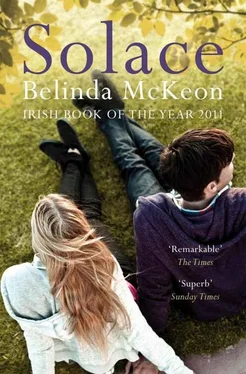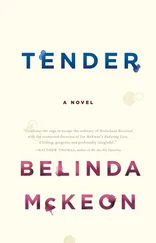‘April, yes,’ said Robinson, thoughtfully. ‘They were taking a walk around Fellows’ Square. It was a Saturday, a cold day. The little one’s cheeks were bright red.’ He looked at Mark as though he had suddenly remembered something. ‘What is it, your daughter’s name?’
‘Aoife.’
‘That’s right.’ Robinson nodded. ‘Aoife, from the Children of Lir.’
‘No,’ Mark began to say, but he stopped himself. He found that he did not want to admit to Robinson that he and Joanne had not taken Aoife’s name from any myth or legend, that they had chosen it only because they both liked it. He did not want Robinson to think less of Joanne for this. But, it struck him, what if Joanne had, indeed, told Robinson that they had chosen the name for some such reason? Would she have done that? Was Robinson someone she had so desperately wanted to impress? The vision of him sodden and dripping in the shower stall came to Mark: the withered skin at his elbows, the hard, stark bulbs of his knees. Or, he thought then, could Aoife’s name have held some meaning for Joanne, a meaning she had never shared with Mark, a meaning she had for some reason kept to herself? What else did Robinson know about her? What else had she told him that she had never told Mark?
‘It struck me that day,’ said Robinson, looking to the empty fireplace, ‘that she was very content, your Joanne. Richly content, I would say. She seemed very different from the young woman I’d met, oh, I suppose, two years previously.’ He frowned. ‘I think it was about that. Since I’d seen her.’
Out of the questions that spilled into Mark’s mind then, he could not choose just one to ask. Where had she been that day? What had she talked about with Robinson? Where had she been going when she saw him? What had she been doing — what had been going on in her life? Had he met her yet, had they been seeing each other? He calculated; no, two years back from April she would still have been innocent of him, still clear of everything to do with him — every connection, every moment afterwards that would lead to Aoife, and to all that went with Aoife, and to being in a car with his mother on the Longford road on a Saturday afternoon in April. Two Aprils ago, she had been free, Joanne. She had had a chance. But Robinson was saying she was different then — that she was not so happy, was that what he had said? How could he tell that she was happier the second time? Mark tried to picture her, walking with the pushchair through campus: what had she been doing there? Taking a break from shopping? Sitting on a bench to eat lunch, or read the newspaper, or throw crumbs to the pigeons on the lawn while Aoife reached out for them and squealed? He stared at Robinson as though the folds of his clothes, the curl of his beard, the grip of his fingers on the coffee mug would give the answers. Joanne, alive and content, on a Saturday in April. Which Saturday, of the few that had been left to her? What had she been thinking that day? What had she been planning? And where had Mark been while she was doing it?
‘You were at a bachelor party that weekend, if I remember correctly,’ Robinson said, and Mark looked at him, startled. Had he spoken aloud? Was Robinson responding to what he had said? But he knew he had been silent. Robinson was just doing what Mark wanted him, after all, to do: putting together the pieces of the day. But it was painful to be reminded of how he had spent that last weekend, of how he had wasted it: getting pissed in Wicklow for two days on Nagle’s stag party. Joanne had encouraged him to go; it didn’t matter how he felt about Nagle, she said. Nagle had invited him, and Mossy would be there, and it would be fun, and he should go, she said. She could look after Aoife by herself for one weekend. You need the break, she had said to him. Just go.
‘In Glendalough,’ Mark said. ‘A friend of mine from college.’
‘Beautiful spot,’ Robinson said. ‘Once you get away from the business end of it. High up in the valley, you could forget you were part of this life at all. Though I doubt the bachelor party was spent in the quiet of the valley?’
Mark managed a laugh. ‘It wasn’t exactly monastic,’ he said, and that hurt as well, because as soon as he said it he was back in the kitchen with her that first night she had cooked him dinner, that first night she had led him up to her room, and he thought now it had been a mistake, after all, to have come looking for details of her that were new to him, when he was barely able to manage the details he already had.
‘And your research?’ Robinson said, out of the silence. ‘Joanne mentioned that you were working on Scott? I know only what Bertrand Russell said of him, I’m afraid, which is only the painfully obvious. “Scott is the author of Waverley .” Which is not the same as Scott being Scott.’
Mark felt at once panic at not understanding whatever it was that Robinson was talking about — could he be raving? — and relief at being able to close it down with an entirely different subject. ‘It’s actually Edgeworth I’m working on,’ he said. ‘Though she and Scott were very good friends.’
‘Ah,’ said Robinson. ‘ Castle Rackrent. I think old Thady Quirk is one of the most memorable of characters, don’t you?’
‘Oh, yeah,’ Mark said, without enthusiasm. He did not want to talk about Thady Quirk. He wanted to talk about Joanne. Or at least he had thought he did until a minute ago. ‘Thady’s a gas man,’ he said, and immediately cringed.
But Robinson nodded. ‘An utter cliché, but like so many clichés, an absolute truth.’
‘Right,’ Mark said uncertainly.
‘I mean, they’re still everywhere in this country, really, aren’t they?’ Robinson said airily. ‘I believe they’re referred to as local characters.’ He looked at Mark more closely. ‘You’re from the country, aren’t you?’
‘I’m from the same place Joanne was from,’ Mark said.
‘Really?’ Robinson looked surprised.
‘Yeah. Longford.’
‘Oh, well,’ Robinson said, ‘I don’t mean to suggest you have them only in Longford. Or in the country, for that matter.’
Mark frowned. ‘Have who?’
‘Oh. .’ Robinson waved a hand. ‘Ignore me. I ramble. My children tell me that all the time. Their mother did too.’
He looked at Mark suddenly, a flutter of panic on his face. ‘God!’ he said. ‘I’m afraid I’ve completely neglected to tell you how sorry I am about your mother. I do apologize.’
‘It’s all right,’ said Mark.
‘Indeed, it’s quite unforgivable.’ Robinson shook his head. ‘Not even in the card, if I remember?’
‘Really, it’s not a problem,’ Mark said. ‘Thank you.’
Robinson weighed this for a moment. ‘And your father?’
‘My father’s fine,’ said Mark. ‘As fine as can be expected. He’s busy.’
‘The only way,’ Robinson said. ‘Partly because it’s the only way to get other people to leave you alone. That’s what I found.’
‘This is it,’ Mark said. He wanted, now, very much to leave. The conversation had seemed never to go beyond an awkward and useless skimming of facts. Robinson had told him nothing, given him nothing that he could take home and add to the store of kept traces. It had been a wasted journey. He made a move to stand, to announce that it was time for him to go, but then Robinson sighed deeply and looked over to him, nodding slowly.
‘I’m afraid it’s just a matter of forward equilibrum, you see,’ he said.
‘Yes,’ Mark said carefully.
‘Time marches on, and you’re best to go along with it.’
‘You are.’
Now Robinson stood. Leaving his unfinished mug of coffee on the floor beneath the armchair, Mark did the same. ‘Thanks for seeing me,’ he said.
Читать дальше












